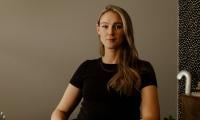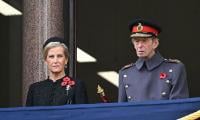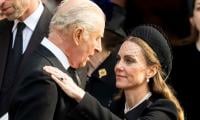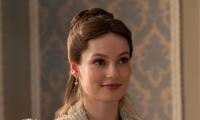The sad decline of carol singing is playing havoc with children’s voices
I attended four separate festive performances involving my three children this year, and not one of them involved a carol’
Ding, dong merrily on high, it’s Christmas, and hopefully you’ll either have sung your heart out at Midnight Mass last night or be singing in the morning. Because if you can’t sing a carol at Christmas, then when can you?
Increasingly, it seems, the answer is rarely – at least if you’re a child at school. I attended four separate festive performances involving my three children this year, and not one of them involved a carol – unless you count “We Wish You A Merry Christmas”, which I don’t.
No Silent Night, no Hark the Herald – no Away in a Manger, even: the perfect Nativity play carol for lisping little voices. It made me sad, then angry, and then I went home and blasted heavy organ and the choir of King’s College, Cambridge on a loop for the next three days.
Carols are part of our musical and cultural heritage. When we raise our voices to sing “O Come All Ye Faithful” – or Adeste Fideles if you prefer the Latin – on Christmas morning, we’re singing words that date back to the 1700s, to a tune that was written in 1841.
The same words, and the same notes, have been sung in churches up and down the land for literally hundreds of years. As we sing them, we become part of that great ancestral line of choristers passing the music on to our own children.
What’s more, singing them now is a uniquely unifying experience (surely more important in these febrile times than ever before).
As Britain becomes gradually more secular, with less experience of regular, communal spiritual practice, weddings, funerals and Christmas (Easter has pretty much fallen off the list, alas) are increasingly the only time we come together to take part in, or observe, an act of worship – and join in the practice of making music together with our voices.
The perfect blend of the poetic, the spiritual and the musical, carolscan also be incredibly pertinent, and extraordinarily relevant. Singing “It Came Upon The Midnight Clear” (composed in 1849) at this year’s Telegraph carol service, the words could have been written expressly for our times:
“Yet with the woes of sin and strife/ The world has suffered long;/ Beneath the angel-strain have rolled/ Two thousand years of wrong;/ And man, at war with man, hears not/ The love-song which they bring;/ O hush the noise, ye men of strife,/ And hear the angels sing.” Who could not fail to be comforted singing such words?
So what’s stopping us from exploring our wonderful canon of carols? Is it fear of causing cultural, or spiritual offence? Perhaps – but my children’s school Nativity play was the Christmas story, told clearly and simply, despite the school not being C of E. So the message of a traditional carol doesn’t seem to be the problem. What seems more likely is the modern cult of “accessibility”. If teachers, let alone children, are increasingly unlikely to know what “The First Nowell” is, or struggle to get to grips with the old-fashioned English of the words, it’s easier all round to sing “I Wish it could be Christmas Every Day” or “All I Want for Christmas is You”.
Sadly, not singing them – along with the assembly hymns of the regular year – is having a knock-on effect.
Children these days simply don’t, can’t, sing as high as they used to. My son’s singing teacher tells me that boys’ voices break on average two years earlier than they did, which according to him is partly because they don’t exercise them into the high register any more.
Pop songs are sung in the speaking register. Singing them doesn’t require you to access that “head voice” that the descant of “Hark the Herald” does.
Grumpy old woman that I might sound, I don’t completely despair. I sing with the wonderful Bach Choir, and for the last two years we have sung an entirely new carol at one of our Christmas concerts: the winning entry from the Sir David Willcocks Carol Competition, which started in 2017. This year’s winner, called The Snow Lies Thick, was written by Ruth Sellar, a music teacher herself, who composed another prize-winning carol back in 2012. Clearly we have an appetite for carols, so all is not entirely lost.
Let’s hope Ms Sellar is teaching it – and all the other, glorious carols out there – to her young pupils. And in the meantime, let’s sing them with our own children, whether lisping, tuneless, or soaring trebles. Because at Christmas, there’s nothing more accessible than a carol.
—Courtesy The Telegraph
-
 Don Lemon Arrested When Covering Grammy Awards In LA ,says Attorney
Don Lemon Arrested When Covering Grammy Awards In LA ,says Attorney -
 Paris Hilton Talks About Her Experience As Meghan Markle's Guest
Paris Hilton Talks About Her Experience As Meghan Markle's Guest -
 Meta To Face New Trial Over Child-exploitation Claims
Meta To Face New Trial Over Child-exploitation Claims -
 NASA’s Hubble Sparks Viral Buzz With Bird-shaped Illusion In Deep Space
NASA’s Hubble Sparks Viral Buzz With Bird-shaped Illusion In Deep Space -
 Kate Middleton, Prince William Worried For Princess Charlotte
Kate Middleton, Prince William Worried For Princess Charlotte -
 Kylie Kelce Reveals Shocking Name Her Daughters Has Given Her
Kylie Kelce Reveals Shocking Name Her Daughters Has Given Her -
 Prince William Mocked For 'shunning' King Charles' Big Day
Prince William Mocked For 'shunning' King Charles' Big Day -
 Elon Musk Hints At Starlink-powered Smartphone
Elon Musk Hints At Starlink-powered Smartphone -
 California Dancer ‘beheaded Boyfriend’ Before Fleeing To Mexico
California Dancer ‘beheaded Boyfriend’ Before Fleeing To Mexico -
 Erika Slezak Opens Up About Her Return To General Hospital
Erika Slezak Opens Up About Her Return To General Hospital -
 Trump’s Tariff Threats: A New ‘bargaining Chip’ In Geoeconomic Strategy
Trump’s Tariff Threats: A New ‘bargaining Chip’ In Geoeconomic Strategy -
 Royal Family Shares Major Update On Duchess Sophie, Duke Of Kent 'out-of-this-world Visit'
Royal Family Shares Major Update On Duchess Sophie, Duke Of Kent 'out-of-this-world Visit' -
 Richard Marx Claims THIS Musician Rejected Him As A Singer
Richard Marx Claims THIS Musician Rejected Him As A Singer -
 Albatross Mystery: Critically Endangered Bird Spotted 4,800km From Home
Albatross Mystery: Critically Endangered Bird Spotted 4,800km From Home -
 Halle Berry Reveals How It Felt To Film With Chris Hemsworth, Barry Keoghan, Mark Ruffalo
Halle Berry Reveals How It Felt To Film With Chris Hemsworth, Barry Keoghan, Mark Ruffalo -
 Kensington Palace Shares Exciting News About Kate Middleton After King Charles Ultimatum
Kensington Palace Shares Exciting News About Kate Middleton After King Charles Ultimatum



